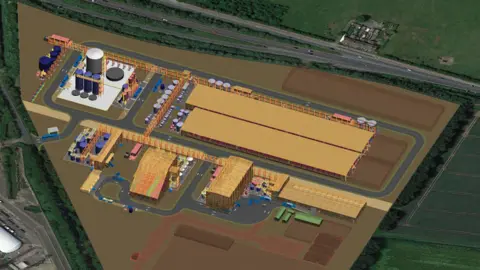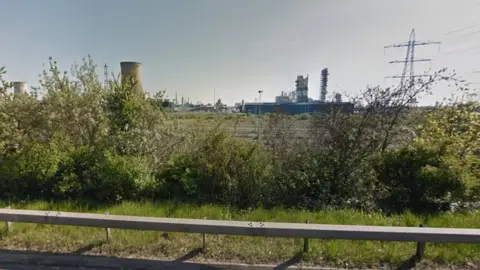Hull: Saltend rare earth magnets factory gets go-ahead
 LDRS
LDRSPlans for a £150m factory near Hull which will make materials for magnets used in electric cars and wind turbines have been approved despite objections.
The plant, which will process rare earth materials, will be built next to the existing Saltend Chemical Park.
More than 30 objections to the factory were received, including concerns over environmental risks, traffic and the plant's proximity to homes and roads.
Pensana said it would create 125 jobs as well as 450 construction jobs.
According to the Local Democracy Reporting Service, William Izod, Pensana's chief commercial officer, told East Riding of Yorkshire Council's planning committee that the plant would pose a low risk to the area and help break China's monopoly on producing the magnets.
"Rare earth minerals are used in the production of high strength magnets and we need a sustainable source for these," he told councillors.
"About 90% of these magnets are produced by China. There is a risk they could dictate prices or limit the export of them, which would threaten renewable energy production.
"The products which we use are both non-hazardous and low-risk," he added.
Pensana previously said the raw materials for its products would come from a sustainable mine in Angola.
 Google
GoogleThe 37 acre (15 hectare) site will be built on farmland between the A1033 and Paull Road and Pensana has agreed to pay £30,000 towards improvements on the A1033 as part of conditions to develop the site.
Council environmental control officers, local drainage boards, Natural England and other bodies did not object to the plans for the factory, while initial opposition from the Environment Agency and Northern Gas Networks was later withdrawn.
But the parish councils of Preston, Paull and Hedon objected, along with 34 people, over the loss of green space, as well as concerns over pollution, flooding and traffic and its proximity to homes.
Councillor John Dennis said the committee needed to take local residents' concerns seriously.
"Residents have put up with chemical works for the best part of 100 years, but a site within the community itself is a step too far," he said.
"HGVs coming and going from the site during construction will bring additional problems.
"Putting this huge building right on locals' doorsteps is unacceptable."
Mr Izod told the committee Pensana settled on the site because of the area's established chemicals industries and it being close to the University of Hull, which could provide future employees.
The plant will also be subject to a separate application for an Environment Agency permit controlling noise and emissions, which will be needed before it can begin operating.

Follow BBC East Yorkshire and Lincolnshire on Facebook, Twitter, and Instagram. Send your story ideas to [email protected].
